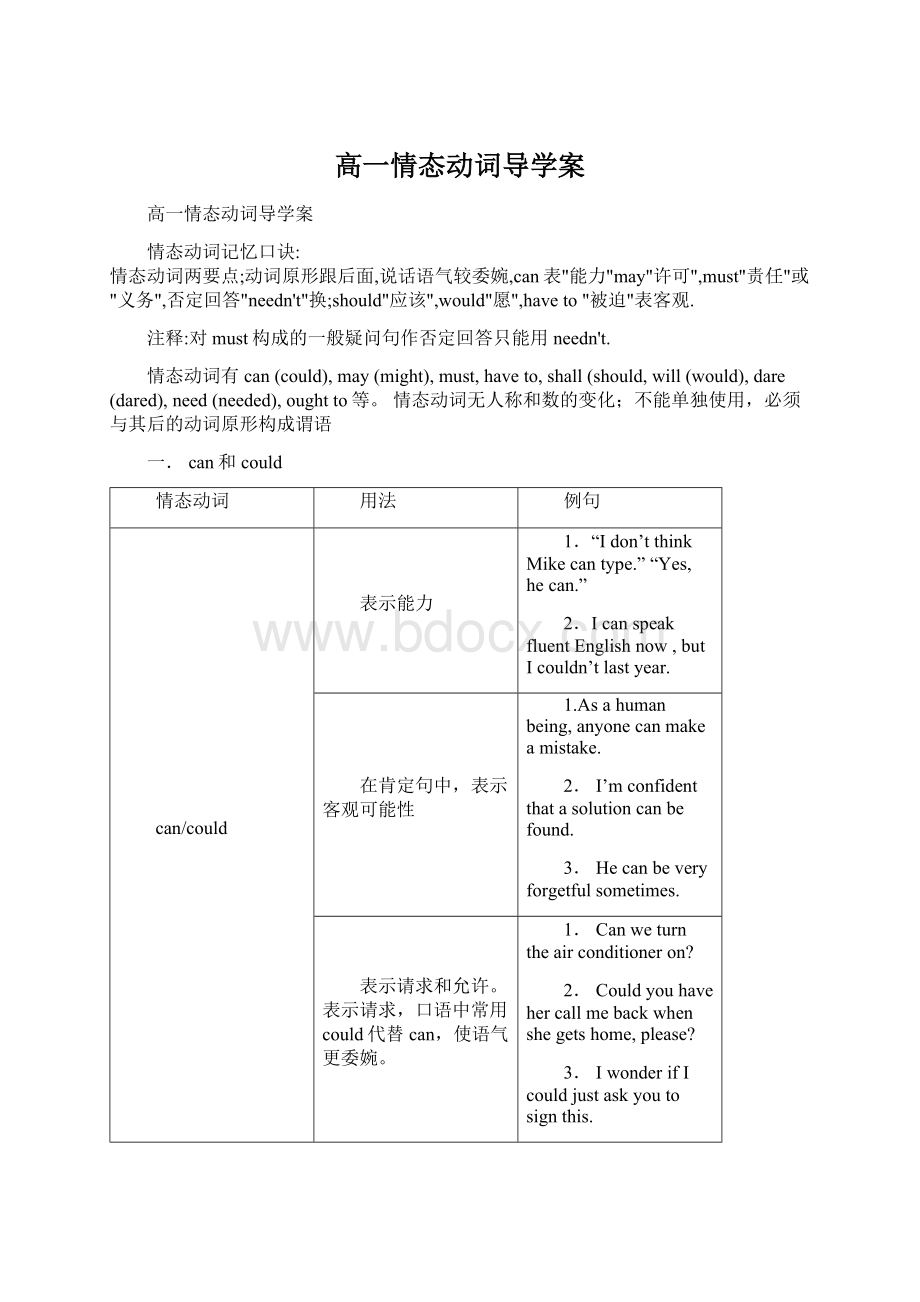高一情态动词导学案Word文档格式.docx
《高一情态动词导学案Word文档格式.docx》由会员分享,可在线阅读,更多相关《高一情态动词导学案Word文档格式.docx(23页珍藏版)》请在冰豆网上搜索。

情态动词
用法
例句
can/could
表示能力
1.“Idon’tthinkMikecantype.”“Yes,hecan.”
2.IcanspeakfluentEnglishnow,butIcouldn’tlastyear.
在肯定句中,表示客观可能性
1.Asahumanbeing,anyonecanmakeamistake.
2.I’mconfidentthatasolutioncanbefound.
3.Hecanbeveryforgetfulsometimes.
表示请求和允许。
表示请求,口语中常用could代替can,使语气更委婉。
1.Canweturntheairconditioneron?
2.Couldyouhavehercallmebackwhenshegetshome,please?
3.IwonderifIcouldjustaskyoutosignthis.
表示惊异、怀疑、不相信等态度,主要用在否定句、疑问句和感叹句中。
1.Canthisbeanexcusefornotgivingthemhelp?
2.Thiscan’tbetrue.
3.Howcanyoubesocrazy.
表示对现在的动作或状态进行主观的猜测,主要用在否定句和疑问句中。
1.Itcan’tbeeasycaringforamanandachildwhoarenotyourown.
2.Canthemanovertherebeourheadmaster?
特别说明:
(1)could用来表示请求时,语气委婉,主要用于疑问句,不能用于肯定句,答语应用can(即:
could不能用于现在时态的简略答语中)。
如:
——CouldIuseyourdictionary?
——Yes,youcan.(否定回答可用:
No,I’mafraidnot.)
(2)can和beableto辨析
can(could)和beableto都可以表示能力,意思上没有区别。
但can只有现在式和过去式,而beableto则有更多的形式。
I’vealwayswantedtoabletospeakfluentEnglish.
Thosebagslookreallyheavy,areyousureyou’llbeabletocarrythemonyourown?
但是,表示在过去某时的某一场合经过一番努力,终于做成了某事,通常不用could,而用was/wereableto来表示。
这时,was/wereableto相当于managedtodo或succeedindoing。
Aftertheaccidentitwasalongtimebeforeshewasabletowalkagain.
Thefirewasverybig,butmostpeoplewereabletoescapefromthebuilding.
(3)惯用形式“cannot…too…”或“cannot/never…..enough表示“无论怎么……也不(过分)”。
Youcan’tthinktoohighlyofhim.
Youcannotbetoocareful.=Youcanneverbecarefulenough.你越小心越好。
Ireallycannotthankyouenough.It’sbeenanamazingday.
(4)惯用形式“cannotbut+不定式(不带to)”表示“不得不,只好”。
Icannotbutadmireherdetermination.我不得不钦佩你的决心。
(5)惯用形式cannothelpbutdosthcannothelp(doing)sth作“不得不,不能避免,不禁”讲。
如:
Thegirlcouldn’thelpbutliveonherself.小女孩不得不自食其力。
WhenItrytospeak,Ican’thelpmakingmistakes.我一开口说话,就禁不住犯错误。
二.may和might
may/might
表示允许、许可。
否定回答一般用mustnot/mustn’t,表示“禁止、阻止”之意,但也可以用hadbetternot(最好别)或maynot(不可以),语气较为委婉。
1.MayIcomeinandwait?
2.——MayIsmokehere?
——No,youmustn’t
(或No,you’dbetternot.)
在表示请求、允许时,might比may语气更委婉些。
用MayI征询对方许可在文体上比较正式,在口气上比较客气,在日常用语中,用CanI征询对方意见更为常见。
1.MightIborrowyourpen?
2.IwonderifImightspeaktoyourson.
表示可能性的推测,通常用在肯定句和否定句中,含有“或许”“大概”“可能”之意;
用might代替may时,则语气显得更加不肯定。
1.Itmayrainthisafternoon.
2.Shemightcometojoinusthisafternoon.
3.Isupposehemighthavemissedthetrain.
may用于祈使句表示祝愿,倒装。
1.Mayyousucceed.
2.Longmayhelive!
愿他能持续住下去。
3.Maysherestinpeace.愿她安息。
惯用句式:
“maywell+动词原形”,表示“有充分的理由可以”或“有可能”。
相当于tobeverylikelyto
“mayaswell或might(just)aswell+动词原形”表示有礼貌地劝告,意为“还是。
。
的好”
1.Youmaywellsayso.你很有理由这样说。
2.Theremaywellbearealproblemhere.
3.Thereisnothingtodo,soImayaswellgotobed.
4.Youmayaswelltellusnow,we’llfindoutsoonerorlater..
三.must和haveto
must
表示“必须,应该”之意,语气比should,oughtto强烈。
其否定形式mustn’t表示“不准,不应该,禁止”等意
1.Youmustcometoschoolontime.
2.Everybodymustobeythelaw.
3.Youmustn’tdrivesofastinthestreet.
4.Wemustn’twasteanymoretime.
在回答带有must的问句时,否定回答常用needn’t或don’thaveto.
1.—MustIcomebackbeforeten?
—Yes,youmust.(No,youneedn’t)
表示有把握的推测,意为“一定、准是、相必”,只用于肯定句中
1.Itmustbemymother.
2.Youmustbehungryafterawalk.
3.Theremustbeaholeinthewall.
表示说话人不满的语气。
“偏偏”“偏执”“固执”
1.Whymustyoualwaysinterruptme?
2.Itcan'
thelp.Hemustgowithme.
haveto
“必须,不得不”,意义与must相近。
但must表示的是说话人的主观看法,而haveto则往往强调客观需要。
1.Thefilmisnotinteresting.Ireallymustgonow.
2.Ihavetogonow,becausemymotherisinhospital.
must只有一种形式,即现在式与过去式都是一种形式,而haveto则涉及各种人称、时态等方面的变化形式。
1.IhadtoworkhardwhenIwasyourage.
2.Iwillhavetolearnhowtouseacomputer.
3.Inordertotaketheexam,we’llhavetofinishthewholebookbytheendofthismonth.
两者的否定意义不同,mustn’t表示“禁止,不许”,don’thaveto表示不必。
1.Youmustn’tgothere.
2.Youdon’thavetogothere.
1.must表示推测时,其反意疑问句应根据动词的实际时态而变化。
Itmustbenicetotakeawalkhere,isn’tit?
Tombuysalotofapples,hemustlikeeatingthem,doesn'
the?
2.Musthavedone的反意疑问句有三种情况:
①从句中含有过去的时间状语,反意疑问句用过去时.
Thegroundiswet,itmusthaverainedlastnight,didn’tit?
②从句中含有过去完成时的时间状语,反意疑问句用过去完成时.
Bytheendoflastterm,wemusthavelearnt2000words,hadn’twe?
③若从句中不含任何时间状语,反意疑问句用现在完成时
Wemusthavebeenmetsomewhere(before),haven’twe?
3.must表示“必须”“有必要”时,反义疑问句部分用mustn’t...?
或needn’t...?
Youmustgohomerightnow,needn’tyou?
4.must用否定形式mustn’t时,附加疑问句部分用may或must…?
Youmustn’tcheatintheexamination,mustyou?
四.shall和should
shall
用于第一、三人称构成的疑问句,表示征求对方意见或请求指示
1.ShallIopenthewindow?
2.Shallwesay6o’clock,then?
3.WhatshallIgetfordinner?
用于第二、三人称陈述句中,表示说话人给对方的命令、警告、允诺或威胁。
1.Don’tworry,youshallgettheanswerthisafternoon.(允诺)
2.Heshallbesorryforitoneday,Itellyou.(警告)
3.YoushalldoasIsay.(命令)
4.Ifyouchildrendon’tdoasItellyou,youshallnotgototheparty.(威胁)
在条约﹑规定﹑法令等文件中表示义务或规定,“应……,须……,得……”
用于第三人称。
1.ThenewregulationshalltakeeffectonJune1st
2..Don'
tworry,sir!
Allpaymentsshallbemadebytheendofthemonth.
3.Thefineshallbegivenincash.罚款须以现金缴纳。
should
表示劝告或建议,意为“应该”
1.WhatshouldIdo?
2.ShouldItrusthim?
3.Youshouldreadhisnewbook.
表示推测,用在肯定句中,通常指有事实依据,常理推断。
意为“想必,大概,或许”
1.Itshouldbeanicedaytomorrow.
2.TryphoningRobert,heshouldbehomenow.
3.Heshouldbearoundsixtyyearsold.
还可以用在if引导的条件状语从句中,表示语气较强的假设,译作“万一,竟然”,这时也可将should置于从句之首,省略if..主句谓语动词用虚拟语气:
would/could/should/might+动词原形
1.AskTomtoringmeupifyoushouldseehim.
2.ShouldIbefreetomorrow,I’llcome.(万一我明天有时间,我就过来)
3.Ifthingsshouldchangesuddenly,pleaseletmeknow.(万一情况突变,请通知我)
4.Ifitshouldsnowtomorrow,wecouldtakephotosoutside.
用于疑问句或感叹句中,表示意外、惊异的情绪,意为“竟会”,与why,what,how,who连用,如果是疑问句,则不需要回答。
1.WhyshouldanyonewanttomarryTony?
2.Don’taskme.HowshouldIknow?
用于第一人称时,可表示客气的请求,提出意见或建议。
表示说话人的一种谦逊、客气、委婉的语气。
1.Youaremistaken.Ishouldsay.依我看是你搞错了。
2.Ishouldliketocallmylawyer.
3.---Willyourequireanythingelse?
---Yes,Ishouldlikeawhiskey.
五.will和would
will/would
用于表示意志或意愿。
will指现在,would指过去。
1.Heisthemanwhowillgohisownway.(他首歌自行其是的人。
)
2.Theysaidtheywouldmeetusat10:
30atthestation.
表示请求、建议等,用would比用will委婉、客气。
1.Willyoupleasetakeamessageforhim?
2.Wouldyoupleasetellmeyourtelephonenumber?
表示习惯或倾向,意为“总是,惯于”。
will至现在,would指过去。
1.Thisoldmanisstrange.Shewillsitforhourswithoutsayinganything.
2.Peoplewilltalk.(人们总会说闲话。
3.Whenweworkedinthesameoffice,wewouldoftenhavecoffeetogether.
表示推测,意为“很可能,大概”。
will表示推测比should把握大,比must把握小。
1.Thesethingswillhappen.
2.Thiswillbethehouseyou'
relookingfor.这大概就是你找的那所房子了。
3.Itwouldbeaboutteno’clockwhenhelefthome.
表示规律性的“注定会”。
1.Peoplewilldiewithoutair.没有空气,人就会死去。
2.Oilwillfloatonwater.
表示功能,意为“能,行”。
惯用形式:
willdo/woulddo表示“解决问题”、“就行”。
1.Thatwillbeallright.
2.Eitherpenwilldo.
3.Itwouldnotdotoworktoolate.(工作太晚不行。
用于否定句中,意为“不肯”、“不乐意”
1.Iwon’tlistentoyournonsense.
2.NomatterwhatIsaid,hewouldn’tlistentome.
would与usedto辨析
would可用来表示过去反复出现的动作,但不能表示过去存在的状态,所以我们不能说:
“shewouldbeaquietgirl.”
另外,would强调过去某种特定情况下的活动,是完全过去的事情,同现在没有联系。
而usedto则着眼于过去和现在的对比,隐含现在已不存在,动作或状态都可表示。
Would可以表示不规则的习惯,usedto则不可。
Heusedtobeanaughtyboyandcausetrouble.
Iusedtogetupatsixinthemorning.
Sometimesshewouldtakeawalkintheneighboringwoods.
Inthosedays,wheneverIhaddifficulties,IwouldgotoMr.Chenforhelp.
6.need和dare
need
用于表示“需要,必要”之意。
做情态动词时,仅用于否定句和疑问句,只有现在时,过去式要用needn'
thave,疑问式用need+人称,否定式用neednot(即needn'
t),
1.—Needweleavesoon?
—Yes,youmust.(No,youneedn'
t)
2.Youneedn'
thavehurried.
(=Itwasnotnecessaryforyoutohurry,butyoudid).你当时不必这么匆忙。
做实义动词时,其变化与一般的实义动词相同,后接带to的不定式(needdoing=needtobedone),过去式用needed、didyouneed?
和didn'
tneed,肯定式用needs/needed/need,疑问式用do、does、did提问,否定式要在前面加don'
t、doesn'
t、didn'
t
1.Ajoblikenursingneedspatienceandunderstanding.(need+名词,needunderstanding=needtobeunderstood,需要被理解)
2.Heneedstoseeadoctor.(needtodo)
3.Doyoustillneedvolunteerstohelpcleanupaftertheparty?
(needsomebodytodosomething)
4.Theydidn'
tneedtostartsoearly.(donotneedtodo)
dare
用于表示“敢于”之意。
做情态动词,没有人称和数的变化,主要用于否定句、疑问句和条件状语从句中
1.—Dareyoutellherthetruth?
—Yes,Idare./No,Idaren’t.
3.Howdareyouaccusemeoflying!
4.Hedaren’tadmitthis.
用作实义动词时,其变化与一般的实义动词相同。
在肯定句中,dare后接带to的不定式;
否定句中,dare后既可接带to的不定式,也可接不带to的不定式。
1.Onlyafewjournalistsdaredtocoverthestory.
2.Hedoesn’tdare(to)gotherealone.
3.Don’tyoudare(to)touchit?
Idaresay…作插入语,我想,大概,可能,或许
1.Youaretired.Idaresay.
我想你是累了。
2.Idaresayyou'
vespentallyourmoneybynow.我估计你的钱现在已经用完了。
七.ought的用法:
oughttodo
表示“应该”之意,同should,。
表示义务或责任,比should语气重。
1.Yououghttotakecareofhim.
2.—OughtIgonow?
—Yes,yououghtto./No,yououghtn’tto.
表示推测。
注意与must表示推测时的区别
oughtto(客观推测),must(主观推测)。
1.Hemustbehomebynow.(断定他已到家)
2.Heoughttobehomebynow.(不十分肯定)
3.Thisiswheretheoilmustbe.(比较直率)
4.Thisiswheretheoiloughttobe.(比较含蓄)
说明:
should与oughtto表示“应该”时的区别
should表示自己的主